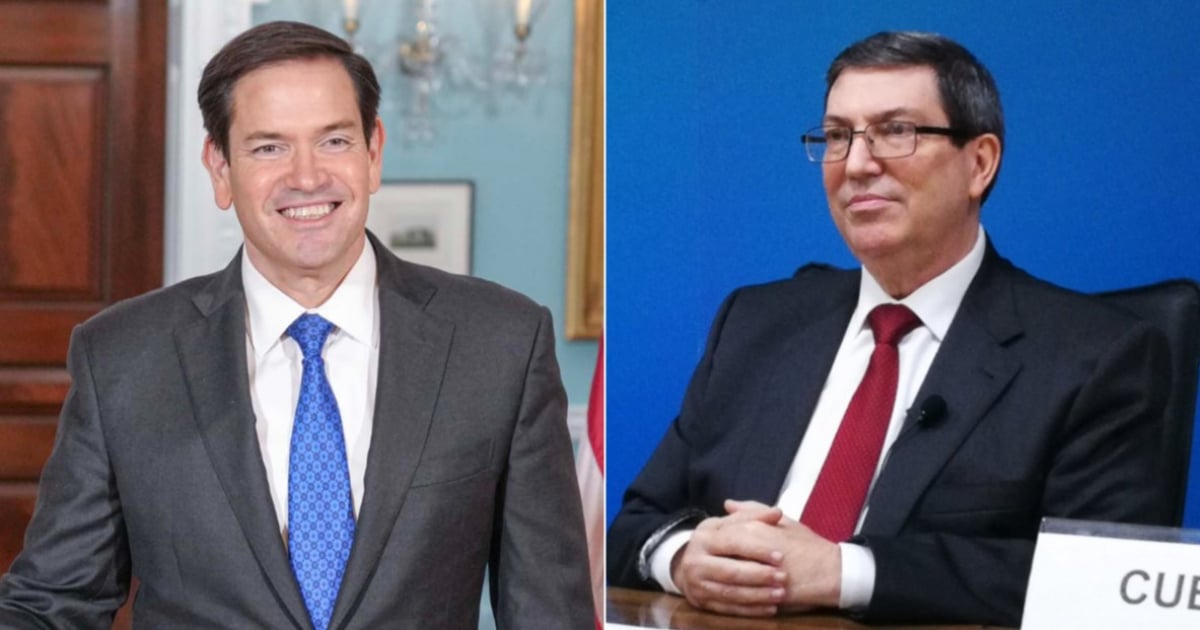In a new demonstration of the official cynicism that characterizes the Cuban regime, Foreign Minister Bruno Rodríguez Parrilla lashed out on social media against the U.S. Secretary of State, Marco Rubio, accusing him of “betraying” the Cuban migrants whom Rodríguez claims he himself encouraged to emigrate.
In an attack aimed more at distracting than debating, Rodríguez wrote on X: “The Secretary of State of the U.S. has gone from being a demanding and arrogant senator to being an echo and a prominent employee of the White House and the plutocracy that governs the U.S.”
“He has betrayed those he encouraged to migrate, accusing them of being criminals and killers. Has he sold his commitments to buy his current position?” he added, along with a photo of ICE agents during an arrest.
The Cuban chancellor once again resorts to his usual script of blaming the United States and its representatives for the hardships that burden the Cuban people, completely ignoring that his own government drove more than half a million citizens into exile in 2024 alone, according to independent estimates by demographer Juan Carlos Albizu-Campos. The regime’s official figure, as always, downplays the exodus, acknowledging only about 250,000 emigrants.
Bruno Rodríguez, a representative of a system that since 1959 has turned mass emigration into a political escape valve, accuses Rubio of hypocrisy, while he himself represents a government that persecutes those who decide to leave the country, suppresses dissenting views, and expels young people from work or university for ideological reasons.
In March, Rodríguez had already called Rubio “corrupt, bland, and a blackmailer”, and held him responsible for the “persecution” of Cuban migrants in the United States.
His statements contrast with the reality that many Cubans who today seek to legalize their status in that country do so precisely because they have been repressed or marginalized by the system that Rodríguez represents.
In February, following the expansion of visa restrictions imposed by Washington on Cuban officials involved in international medical missions, Rodríguez renewed his attack on Rubio, accusing him of putting “his personal agenda above the interests of the United States.”
The medical labor export program, which is nothing more than a form of covert labor exploitation, allows the regime to benefit financially while the doctors are monitored and separated from their families—a situation that, in Rodríguez’s view, is no injustice at all.
But Marco Rubio argues that these visa restrictions on Cuban officials aim to curb the impunity of a system that oppresses, censors, and profits off its citizens.
In his role as Secretary of State, he has been emphatic that any rapprochement with Havana must be conditioned on real advancements in human rights and democracy.
I have no intention of going to Havana with this regime in power, except to discuss when they are leaving,” he said in an interview.
Meanwhile, Rodríguez maintains an arrogant and defiant stance. In February, he stated that the Republican politician “will be left wanting” to visit Cuba, and claimed that he “was not invited” because “he knows absolutely nothing about the country.”
The rhetoric of the Cuban official aims to blame others for the collapse of a model that no longer offers a future to its people.
Accusing the U.S. Secretary of State of “betraying” Cuban migrants is grotesque when the true traitor to its citizens is a regime that forces them to flee in order to live with dignity.
The inconsistency of the attacks only highlights the desperate attempt of the Cuban government to divert attention from its own structural failure.
For his part, Marco Rubio, one of the regime’s most ardent critics, has stated that “castroism represents a direct threat to the national security of the United States” and has promoted multiple resolutions to sanction Havana for its ties with hostile powers such as China, Russia, and Iran.
Rubio has also reiterated his support for the Cuban opposition and has demanded that any relief or negotiation with the regime be contingent upon verifiable democratic changes.
“The Cuban regime has repeatedly demonstrated that it will not respect human rights,” he stated in a declaration.
Frequently Asked Questions about Bruno Rodríguez’s Accusations Against Marco Rubio
Bruno Rodríguez accuses Marco Rubio of betraying Cuban migrants by encouraging them to emigrate and then, according to Rodríguez, promoting mass deportation policies and labeling them as criminals and murderers. Rodríguez has pointed out Rubio as the main promoter of the persecution of Cubans in the United States, despite the fact that many of them entered legally and contribute economically and socially to the country.
Marco Rubio is a fierce critic of the Cuban regime, which he considers a threat to the national security of the United States. He has advocated for sanctions against Havana due to its ties with hostile powers and has insisted that any negotiations with the regime must be conditioned on verifiable democratic changes. Rubio defends the measures taken by the U.S. government as necessary to hold the Cuban regime accountable for the exploitation and repression of its people.
The Cuban government blames the U.S. embargo and the Cuban Adjustment Act for encouraging mass emigration, claiming that these policies motivate people to leave the island under the promise of immigration benefits. However, experts point out that the true cause of the exodus is the internal crisis in Cuba, marked by political repression, lack of freedoms, inflation, and shortages of basic goods.
Marco Rubio has defended U.S. policies as acts of accountability towards the Cuban regime, arguing that the measures are necessary to curb labor exploitation and repression on the island. Rubio has reiterated that the Cuban regime must change to improve bilateral relations and has emphasized his commitment to supporting the Cuban opposition and human rights.
